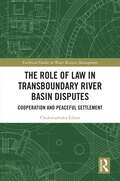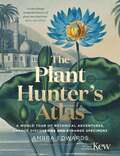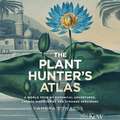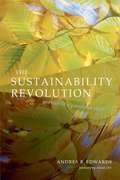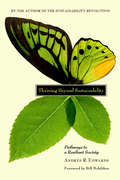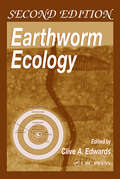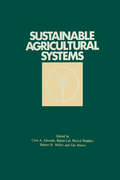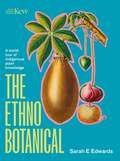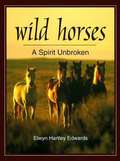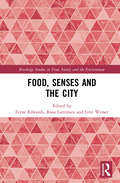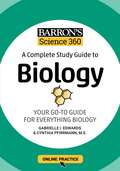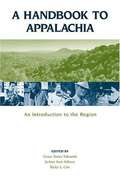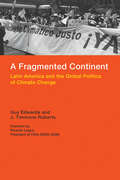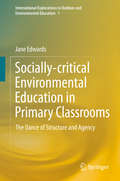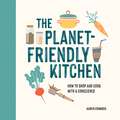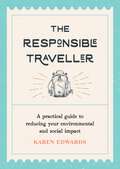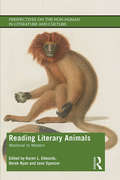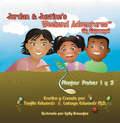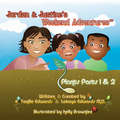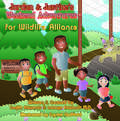- Table View
- List View
The Role of Law in Transboundary River Basin Disputes: Cooperation and Peaceful Settlement (Earthscan Studies in Water Resource Management)
by Chukwuebuka EdumThis book examines the role legal rules play in the resolution of disputes in transboundary river basins. When states fail to resolve disputes over shared water resources, many cast such failures on inadequate or ineffective legal rules. With this view in mind, this book examines the role that legal rules do, and can, play in aiding the peaceful settlement of disputes and furthering cooperation between different parties. Building on the interactional theory of law, this book formulates three analytical frameworks: the effect of norm-generating processes, the effects of water-related agreements and/or arrangements in the basins, and the effect of international water. It uses these frameworks to assess the role of law in the processes of cooperation and peaceful settlement of disputes on transboundary river basin by drawing on four illustrative case studies: the Jordan River Basin, the Nile River Basin, the Mekong River Basin, and the Indus River Basin. In doing so, this book presents a unique perspective on the multi-functional role of legal rules in those processes. Tapping into the global discussion on water security and water-related conflicts, this book stimulates readers to explore broader or interdisciplinary perspectives for understanding water-related issues. This book will be of great interest to students and scholars interested in water resource management, water law, environmental politics, conflict resolution, and sustainable development more generally.
The Plant-Hunter's Atlas: A World Tour of Botanical Adventures, Chance Discoveries and Strange Specimens
by Ambra Edwards'A refreshingly insightful history of plant introductions.' - Roy Lancaster Travel the world with extraordinary tales of the botanical discoveries that have shaped empires, built (and destroyed) economies, revolutionised medicine and advanced our understanding of science.Circling the globe from Australia's Botany Bay to the Tibetan plateau, from the deserts of Southern Africa to the jungles of Brazil, this book presents an incredible cast of characters - dedicated researchers and reckless adventurers, physicians, lovers and thieves. Meet dauntless Scots explorer David Douglas and visionary Prussian thinker Alexander von Humboldt, the 'Green Samurai' Mikinori Ogisu and the intrepid 17th century entomologist Maria Sibylla Merian - the first woman known to have made a living from science.Beautifully illustrated with over 100 botanical artworks from the archives of the Royal Botanic Gardens, Kew, this absorbing book tells the stories of how plants have travelled across the world - from the missions of the Pharaohs right up to 21st century seed-banks and the many new and endangered species being named every year.***THE ROYAL BOTANIC GARDENS, KEW is a world-famous research organisation and a major international visitor attraction. It harnesses the power of its science, the rich diversity of its gardens and collections to unearth why plants and fungi matter to everyone. Its aspiration is to end the extinction crisis and help create a world where nature and biodiversity are protected, valued and managed sustainably.
The Plant-Hunter's Atlas: A World Tour of Botanical Adventures, Chance Discoveries and Strange Specimens
by Ambra Edwards'A refreshingly insightful history of plant introductions.' - Roy Lancaster Travel the world with extraordinary tales of the botanical discoveries that have shaped empires, built (and destroyed) economies, revolutionised medicine and advanced our understanding of science.Circling the globe from Australia's Botany Bay to the Tibetan plateau, from the deserts of Southern Africa to the jungles of Brazil, this book presents an incredible cast of characters - dedicated researchers and reckless adventurers, physicians, lovers and thieves. Meet dauntless Scots explorer David Douglas and visionary Prussian thinker Alexander von Humboldt, the 'Green Samurai' Mikinori Ogisu and the intrepid 17th century entomologist Maria Sibylla Merian - the first woman known to have made a living from science.Beautifully illustrated with over 100 botanical artworks from the archives of the Royal Botanic Gardens, Kew, this absorbing book tells the stories of how plants have travelled across the world - from the missions of the Pharaohs right up to 21st century seed-banks and the many new and endangered species being named every year.***THE ROYAL BOTANIC GARDENS, KEW is a world-famous research organisation and a major international visitor attraction. It harnesses the power of its science, the rich diversity of its gardens and collections to unearth why plants and fungi matter to everyone. Its aspiration is to end the extinction crisis and help create a world where nature and biodiversity are protected, valued and managed sustainably.
The Plant-Hunter's Atlas: A World Tour of Botanical Adventures, Chance Discoveries and Strange Specimens
by Ambra EdwardsThe Plant Hunter's Atlas is a lavishly illustrated volume telling some of the most extraordinary tales of horticultural discovery and exploring the characters behind the stories. Taking in the world's inhabited continents and spanning the centuries, the stories range from tales of derring-do in the age of discovery to modern-day botanists working at the cutting-edge of science. The text explores how plant hunters have been inspired by everything from scientific curiosity to economic greed, and their own ingrained sense of adventure. Each entry is illustrated with botanical artwork from the Royal Botanical Gardens, Kew's unrivalled collection of historical illustrations. Among the plant hunters included are: Sir Joseph Banks, Charles Darwin, David Douglas, Reginald Farrer, George Forrest, Robert Fortune, Tadeáš Haenke, Tom Hart Dyke, Alexander von Humboldt, the Lobb brothers, John Sibthorp and Ernest Henry Wilson.(P)2021 Quercus Editions Limited
The Sustainability Revolution: Portrait of a Paradigm Shift
by Andres R. EdwardsThis book analyzes the sustainability of the five major sectors of society - government, business, ecology, resources and conservation. It explains innovative projects and policies.
Thriving Beyond Sustainability
by Andres R. Edwards Bill MckibbenEvery fifteen seconds on our Earth, a child dies from waterborne disease. Three times an hour, another species becomes extinct. Each day we consume eighty-five million barrels of oil and pump twenty-three million tons of carbon dioxide into an already warming atmosphere. But against this bleak backdrop, beacons of hope shine from thousands of large and small initiatives taking place everywhere from isolated villages to major urban centers.Thriving Beyond Sustainability draws a collective map of individuals, organizations, and communities from around the world that are committed to building an alternative future--one that strives to restore ecological health; reinvent outmoded institutions; and rejuvenate our environmental, social, and economic systems. The projects and initiatives profiled are meeting the challenges of the day with optimism, hope, and results, leading the way in: Relocalization Green commerce Ecological design Environmental conservation Social transformation Overflowing with inspiration, the stories and ideas in these pages will cause the most chronic pessimist to see the glass as half full--to move beyond a perception of surviving with scarcity to one of flourishing with abundance. The comprehensive resource section provides the tools for everyone to become a catalyst for change.Andres R. Edwards is the author of The Sustainability Revolution, which has sold over twenty thousand copies. He is an educator, media designer, LEED-accredited green building and sustainability consultant, and the founder of EduTracks, a firm specializing in developing education programs and providing consulting services on sustainable practices.
Earthworm Ecology
by Clive A. EdwardsEarthworm Ecology, Second Edition updates the most comprehensive work available on earthworm ecology with extensive revisions of the original chapters. New chapters analyze the history of earthworm research, the importance of earthworms as representatives of soil fauna and how they affect plant growth, the effects of the invasion of exotic earthworms into North America and other regions, and vermiculture and vermicomposting in Europe.This well-illustrated, expansive study examines the important and often overlooked impact earthworms have on the environment. It discusses the impact of climate, soil properties, predation, disease and parasitism, and competition upon earthworm ecology.
Sustainable Agricultural Systems
by Clive A. EdwardsA unique look at how the adoption of sustainable farming methods is being pursued throughout the world. This comprehensive book provides clear insight into research and education needs and the many points of view that come to bear on the issue of sustainability. Essential for agricultural leaders in research, education, conservation, policy making, and anyone else interested in creating an economically and environmentally sustainable agriculture worldwide.
The Ethnobotanical: A world tour of Indigenous plant knowledge
by Dr Sarah EdwardsSince the beginning of humanity's existence, plants have provided us with everything we need for our survival - they sustain us with air to breathe, food to eat, materials to make clothes and shelter with, and medicine to treat and prevent disease. Their beauty can also enhance our mood and provide spiritual and emotional nourishment.Western science has 'discovered' and named innumerable plant species over the course of its colonial history. To many Indigenous peoples, however, plants have been recognised for centuries as sentient beings, imbued with spirit and agency to help humanity. Publishing in partnership with the Royal Botanic Gardens at Kew, The Ethnobotanical offers a unique and beautiful perspective on plants and their roles in the lives of peoples from across the planet.
Wild Horses: A Spirit Unbroken
by Elwyn Hartley EdwardsHorses are widely regarded as a favorite among domesticated animals. However, the twentieth century still harbors pockets of untamed horses and ponies whose evolution can be traced back over 60 million years. Wild horses exist in as diverse and hostile locations as the arid deserts of India and the remote sandbanks of Sable Island off the coast of Nova Scotia. Combine adaptability and an aggressive instinct for survival with exceptional stamina and sturdiness, and the resulting profile illustrates the divide between wild horses and domestic stock. Wild Horses traces the origins of today's feral equine species and explains how geographic history and crossbreeding have influenced their development and provided the variety of breeds which now exist worldwide. The wild horse inspires a range of differing responses. The rapid growth of the Australian wild horse population, the Brumby, led to thousands being killed for sport during the 1960s. This contrasts starkly with the treatment of the Kiang herds of the Himalayas, which are heralded as sacred by Tibetans. However, conservation efforts are now enabling many wild horses to survive and even flourish, encouraging a growing admiration and respect for their place in the natural world.
Food, Senses and the City (Routledge Studies in Food, Society and the Environment)
by Ferne Edwards Roos Gerritsen Grit WesserThis work explores diverse cultural understandings of food practices in cities through the senses, drawing on case studies in the Americas, Asia, Australia, and Europe. The volume includes the senses within the popular field of urban food studies to explore new understandings of how people live in cities and how we can understand cities through food. It reveals how the senses can provide unique insight into how the city and its dwellers are being reshaped and understood. Recognising cities as diverse and dynamic places, the book provides a wide range of case studies from food production to preparation and mediatisation through to consumption. These relationships are interrogated through themes of belonging and homemaking to discuss how food, memory, and materiality connect and disrupt past, present, and future imaginaries. As cities become larger, busier, and more crowded, this volume contributes to actual and potential ways that the senses can generate new understandings of how people live together in cities. This book will be of great interest to students and scholars of critical food studies, urban studies, and socio-cultural anthropology.
Barron's Science 360: A Complete Study Guide to Biology with Online Practice
by Gabrielle I. Edwards Cynthia PfirrmannBarron&’s Science 360: Biology is your complete go-to guide for everything biologyThis comprehensive guide is an essential resource for:High school and college coursesHomeschoolingVirtual LearningLearning podsInside you will find:Comprehensive Content Review: Begin your study with the basic building block of biology and build as you go. Topics include, the cell, bacteria and viruses, fungi, plants, invertebrates, Homo sapiens, biotechnology, and much more.Effective Organization: Topic organization and simple lesson formats break down the subject matter into manageable learning modules that help guide a successful study plan customized to your needs.Clear Examples and Illustrations: Easy-to-follow explanations, hundreds of helpful illustrations, and numerous step-by-step examples make this book ideal for self-study and rapid learning.Practice Exercises: Each chapter ends with practice exercises designed to reinforce and extend key skills and concepts. These checkup exercises, along with the answers and solutions, will help you assess your understanding and monitor your progress.Access to Online Practice: Take your learning online for 50 practice questions designed to test your knowledge with automated scoring to show you how far you have come.
A Handbook to Appalachia: An Introduction to the Region
by Grace Tomey Edwards Noann Aust Asbury Ricky L. CoxReference work introducing various aspects of the Appalachian region including geography, history, the arts, etc.
A Fragmented Continent: Latin America and the Global Politics of Climate Change (Politics, Science, and the Environment)
by Guy Edwards J. Timmons RobertsHow Latin American countries became leading voices and innovators on addressing climate change—and what threatens their leadership.Latin American countries have increased their influence at the United Nations climate change negotiations and offered potential solutions on coping with global warming. But in the face of competing priorities, sometimes these climate policies are jettisoned, undermined, or simply ignored. A Fragmented Continent focuses on Latin America's three major blocs at the U.N. climate negotiations and how they attempt to balance climate action with building prosperity. Brazil has reduced its deforestation but continues its drive for economic growth and global recognition. A leftist group led by Venezuela, Bolivia, and Ecuador decries the injustice of climate change but is highly dependent on the export of fossil fuels. A new group, including Chile, Costa Rica, and Peru and supported by Mexico, offers sharp reductions in their carbon emissions in return for greater action by others; these countries now have to deliver on their promises. Weaving together issues of politics and economy, trade, foreign policy, civil society, and environmental protection, A Fragmented Continent offers a long-missing perspective on one of this century's greatest challenges and neglected regions.
Socially-critical Environmental Education in Primary Classrooms
by Jane EdwardsThe effectiveness of Education for Sustainable Development depends on the ability of schools and teachers to embrace pedagogies that reduce the gap between the rhetoric of education for the environment and the reality of classroom practices. This book responds to the need to better understand the nature of the relationships between agency and structure that contribute to the development of educational rhetoric-reality gaps in order to inform processes that most effectively facilitate pedagogical change. This book explores the issues of pedagogical change through the experiences of Australian primary school teachers faced with the challenge of implementing an environmental education program in which young students were positioned as active participants in the social processes from which environmentally sustainable practices could be developed. These teachers were required to adopt pedagogies that often represented the antithesis of their well-established teacher-directed approaches. Through the use of Anthony Giddens' Theory of Structuration this book provides unique perspectives of the teacher mediated manner in which certain elements of structure and agency interrelate to enable and constrain classroom practices--essential understandings for school principals and educational policy developers who aim to effectively implement pedagogical change. This book also demonstrates that the Theory of Structuration provides a valuable ontological research framework, and provides social researchers with practical guidance for how to relate this theory to specific research issues.
The Planet-Friendly Kitchen: How to Shop and Cook With a Conscience
by Karen EdwardsWe all have the power to make a differenceWe know our planet’s resources are stretched to the limits. We know that without significant changes to our diets and shopping habits, nature will continue to suffer. But sometimes it feels like we’re bombarded with mixed messages, and it can be hard to work out which foods are truly eco-friendly. This book sets out the facts in a clear and straightforward way, helping you to make informed choices about environmentally conscious ways to shop, the products to avoid, the best foods to buy, and sustainable ways to prepare them.With over 30 delicious recipes that you, and the earth, will love, The Planet-Friendly Kitchen contains all the tips and advice you need to start making small changes that have big impacts. The choices we make can help create a kinder way of feeding the world, and will preserve our beautiful planet for many generations to come.
The Planet-Friendly Kitchen: How to Shop and Cook With a Conscience
by Karen EdwardsWe all have the power to make a differenceWe know our planet’s resources are stretched to the limits. We know that without significant changes to our diets and shopping habits, nature will continue to suffer. But sometimes it feels like we’re bombarded with mixed messages, and it can be hard to work out which foods are truly eco-friendly. This book sets out the facts in a clear and straightforward way, helping you to make informed choices about environmentally conscious ways to shop, the products to avoid, the best foods to buy, and sustainable ways to prepare them.With over 30 delicious recipes that you, and the earth, will love, The Planet-Friendly Kitchen contains all the tips and advice you need to start making small changes that have big impacts. The choices we make can help create a kinder way of feeding the world, and will preserve our beautiful planet for many generations to come.
The Responsible Traveller: A Practical Guide to Reducing Your Environmental and Social Impact, Embracing Sustainable Tourism and Travelling the World With a Conscience
by Karen EdwardsThe Responsible Traveller is your ticket to sustainable and ethical travel. This pocket-sized book provides the knowledge and tools that can help you to explore the world with a lighter footprint.Whether you travel out of curiosity, to find respite, to remind yourself of how vast and wonderful our planet is, or in search of life-shaping adventures, having the freedom to explore can be exhilarating and hugely rewarding. However we owe it to the people, cultures, ecosystems and wildlife that we encounter along the way to travel with respect; to preserve our beautiful world for generations to come.The Responsible Traveller will show you how to make actionable changes that result in more thoughtful and adventurous travels, while also doing our very best for Planet Earth. Through case studies and storytelling, you’ll learn about the environmental and social effects of tourism and gain a deeper understanding of cultural sensitivity. And through simple, achievable tips and practical lifestyle changes, you’ll discover how you can make an almighty difference in reducing your impact. Empowered with this information, perhaps your next adventure will be inspired by consideration, understanding and compassion.
The Responsible Traveller: A Practical Guide to Reducing Your Environmental and Social Impact, Embracing Sustainable Tourism and Travelling the World With a Conscience
by Karen EdwardsThe Responsible Traveller is your ticket to sustainable and ethical travel. This pocket-sized book provides the knowledge and tools that can help you to explore the world with a lighter footprint.Whether you travel out of curiosity, to find respite, to remind yourself of how vast and wonderful our planet is, or in search of life-shaping adventures, having the freedom to explore can be exhilarating and hugely rewarding. However we owe it to the people, cultures, ecosystems and wildlife that we encounter along the way to travel with respect; to preserve our beautiful world for generations to come.The Responsible Traveller will show you how to make actionable changes that result in more thoughtful and adventurous travels, while also doing our very best for Planet Earth. Through case studies and storytelling, you’ll learn about the environmental and social effects of tourism and gain a deeper understanding of cultural sensitivity. And through simple, achievable tips and practical lifestyle changes, you’ll discover how you can make an almighty difference in reducing your impact. Empowered with this information, perhaps your next adventure will be inspired by consideration, understanding and compassion.
Reading Literary Animals: Medieval to Modern (Perspectives on the Non-Human in Literature and Culture)
by Karen Edwards Derek Ryan Jane SpencerReading Literary Animals explores the status and representation of animals in literature from the Middle Ages to the present day. Essays by leading scholars in the field examine various figurative, agential, imaginative, ethical, and affective aspects of literary encounters with animality, showing how practices of close reading provoke new ways of thinking about animals and the texts in which they appear. Through investigations of works by Shakespeare, Aphra Behn, William Wordsworth, Charles Dickens, Virginia Woolf, and Ted Hughes, among many others, Reading Literary Animals demonstrates the value of distinctively literary animal studies.
Jordan & Justine's Weekend Adventures: Plantas Partes 1 & 2
by Latoya Edwards Tanille EdwardsJordan & Justine's Weekend Adventures: Plantas Partes 1 y 2 es una gira educacional explorando el crecimiento de las plantas, la historia del maní, saludables hábitos de comida, fotosíntesis y relaciones familiares. Jordan & Justine's Weekend AdventuresT: Plantas Partes 1 y 2 is an educational ride exploring plant growth, the history of peanuts, healthy eating habits, photosynthesis and family relationships.
Jordan & Justine's Weekend Adventures: Plants Parts 1 & 2
by Latoya Edwards Tanille EdwardsJordan & Justine's Weekend Adventures: Plants Parts 1 & 2 is an exciting educational ride exploring plant growth, the history of peanuts, healthy eating habits, photosynthesis and family relationships. Jordan and Justine start out by helping their mother in her garden one Saturday morning to plant pumpkin seeds. From there, the brother and sister pair learn how seeds sprout into plants, the health benefits of pumpkins, the history of peanuts, how to research on the internet and then they use their magical powers to get an up close look at photosynthesis. Jordan and Justine's Weekend Adventures inspire children to learn about science, to love their families, to be confident and to use their imaginations!
Jordan & Justine's Weekend Adventures: Wildlife Parts 1 & 2
by Latoya Edwards Tanille EdwardsJordan & Justine's Weekend AdventuresTM: Wildlife Parts 1 & 2 brings children right into the center of animal life at a wildlife conservation center. The brother and sister pair, Jordan & Justine, and their two friends, Raj and Ling, learn how koalas live, what it means when an animal is said to be endangered, and how humans can help. Jordan and Justine use their magical powers to explore the world of dolphins, to find out how laws can protect wildlife, and to learn what it means to be a mammal. Perfect for children ages 7 to 9. Also look for Jordan & Justine's Weekend AdventuresTM: Plants Parts 1 & 2, ISBN: 978-0-9787302-4-6, at your local bookstore or online at retailers everywhere. Children love to explore plant growth, healthy eating habits, and photosynthesis with Jordan and Justine in this fun book!

